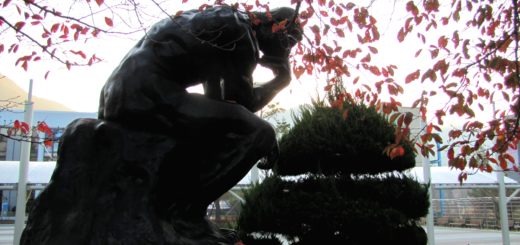How Progressivism Kills Higher Education
Almost two thousand years ago, the Romans rounded up Christians and other offenders against official beliefs and fed them to wild dogs and lions, as a form of popular religious expression/entertainment. A few hundred years ago, it was Christians of Europe and America rounding up alleged witches, and burning them at the stake or hanging them, as an expression of religious orthodoxy.
What do we learn from these examples? If your reaction is, “We learn that people of past ages were irrational, intolerant, and brutal,” then you have not fully escaped the effects of your progressive education. For the Roman Empire that was feeding Christians to the beasts as mass spectacle was the standard-bearer of civilization in late antiquity. The Christians burning witches were involved in the development of the moral constructs of some of the leading, and most civilized, nations of our late modern world.
Meanwhile, in today’s most forward-looking nations, so sure that they are living far above and beyond such inhumanity, millions of healthy human lives are aborted each year, and several European nations boast of having eradicated various genetic defects, by which they mean simply that they have systematically determined to identify fetuses likely to be born with imperfections and kill them.
Furthermore, today, almost every human being who is fortunate enough not to be killed in early development is removed by law, at about age five, from the primary care of his parents, and thenceforth raised, in all essential regards, in government indoctrination centers, by trained and employed agents of government social control, with parents treated, for the most part and increasingly so, as rivals and obstacles to the total absorption of the child into the unified wave of the collective, i.e., the unwavering will of the state.
At the other end of our modern indoctrination process, all the old social customs and moral rules regarding marriage and childrearing, which were developed and maintained for millennia with a view to delaying or curtailing easy physical gratifications, thereby moderating and guiding men’s desires in order to promote deeper attachments to other individuals and to the community, which in turn would foster the properly human longing for the beautiful, with its variously civilizing forms of expression — family love, religious devotion, unifying art, principled statesmanship, intellectual friendship, the search for truth — are being quickly dispatched in favor of the most pettily self-absorbed forms of hedonism. Every pleasure or whim, particularly the most intense, immature, and immediate, is now judged an essential and overriding good, and even more absurdly, a primary source of personal identity; anything that would forestall such pleasures or whims is therefore judged essentially evil, and all attempts to curtail or moderate any urge for gratification unjust. Due to the mechanisms of this carefully manufactured ersatz freedom, which is in truth a reversion to the vectors of material necessity, all the specifically human endeavors — community, art, faith, politics, and thought — are diminished and dying among us, as our species retreats to a superficially decorated primordial existence of impulsively scratching random itches while pounding one another over the head for food and fear.
The only way out of this morass, as with all prior ones into which mankind has descended, is education. In particular, since a general civilizational deterioration cannot be overcome in an instant’s reversal of collective opinion, but rather requires the patient sowing of generations of slow-germinating seeds, each one gradually assuming its place in a localized but radiating societal growth, the necessary education must be profound and individual, not generic and egalitarian. And since what is needed is not a simple displacement of “bad convictions” in favor of “good convictions,” but rather a comprehensive re-evaluation of the premises of our existence, founded in a spirit of courageous uncertainty — in the manner of the Socratic wisdom of knowing that one knows nothing, unlike most men, who know nothing while believing they know — this education must consist chiefly in an open-minded examination of life’s serious alternatives.
In sum, what is most desperately needed is a genuine higher education, meaning one which is liberal and non-dogmatic, in the sense of encompassing and respectfully considering all the most forceful and efficacious of humanity’s attempts and alternatives thus far, however distant some of these may seem from present norms, as well as being elitist and impious, in the sense of paying no heed to current political expectations or popular standards of right thinking.
Nothing is worthy of the name “higher education” which does not meet those criteria. For the truest education is always and necessarily that which begins by rejecting the soul-stultifying path of reinforcing the presuppositions and indoctrinated self-certainties of those undergoing it. The key to the heights in education lies precisely in the uncomfortable but ennobling attainment of a position of self-aware uncertainty, and in the subsequent willingness to proceed, with guidance, from this fresh starting point — the first step in philosophical investigation, the rejection of vested interests and predetermined interpretive “frameworks” — toward a naïve engagement with the ideas and figures history has judged to have offered the most enduring and fruitful avenues in the search for ultimate meaning and purpose.
Progressivism, by its very nature, rejects this notion of higher education outright, for the foundational assumption of all progressive societies, to the extent this perspective is ascendant, is that the (alleged) follies and sins found lying around on the surface of past eras may be regarded as representing the essence of those eras, and hence the absence of those same (alleged) follies and sins in our era adduced as evidence of our essential superiority to the past, as though we had no equivalent follies and sins of our own — apart from, as the progressives would have it, those fading remnants of past eras that we have not completely erased from the collective mind yet. From which it follows that we have nothing important to learn from them, but rather they from us, and therefore that all investigation of past societies, works, and individuals, to the extent such investigations are still done at all, must be approached and carefully framed as opportunities to assert and demonstrate the inferiority of the past, either with a condescending pat on the head (“Look how they were trying to be like us, though falling short!”) or with the disdain of an indignant teenager (“Look how far their so-called great men were from understanding what everyone who is with it today knows perfectly well!”).
But if the major premise of every argument about previous ideas and practices is, “Past ways are inferior,” then there is no way one can ever reach a conclusion that compels reconsideration of one’s presuppositions, which is to say self-doubt, which is to say the essential step beyond the self-protectiveness of knee-jerk indignation, and toward the simultaneously humbling and elevating world of wonder and discovery. Progressivism starves the soul in the trap of present piety, artificially and permanently cutting one off from a rich feast of exciting alternatives and rare delicacies that is sitting right there, just within range of one’s outstretched hands, if only one had not unlearned the will to stretch out.



